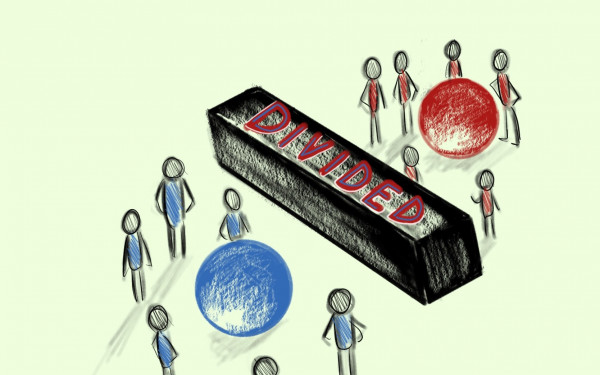Religion influences and encourages right-wing ideologies
The influence of religion in policymaking has been extremely worrying, as it goes against separating the state and the church
Over the past few years, right-wing politics have become more prevalent worldwide.
The rise of right-wing narratives has also coincided with the use of religion to disguise hatred, bigotry and discrimination, defending right-wing ideologies that seek to suppress marginalized communities.
Countries such as the United States have allowed religious beliefs to influence their policymaking, from abortion rights to same-sex marriages.
An example of religion influencing right-wing ideologies is the presence of Christian nationalism, an ideology that seeks to maintain the influence of Christianity in a country’s identity. Christian nationalists believe that the church and the state should not be separated.
The idea of the separation of the church and the state goes way back to 1644 when Roger Williams, the founder of Rhode Island, advocated for “a wall or hedge of separation” between the state and the church. He believed that mixing them could cause both to become corrupt. Today, the very same concern resurfaces once again. It was evident when U.S. President Donald Trump’s administration decided to trample reproductive rights.
Unsurprisingly, most Trump supporters who stormed the Capitol back on Jan. 6, 2021, were seen carrying placards with Christian messages. Some were even seen holding the Bible. To me, it looked like they were there for a religious gathering. These same supporters share the same ideologies as Trump, which usually aligns them with right-wing ideologies.
Canada is obviously not a stranger to the same views.
After all, the country is known for its colonial past, in which missionaries forced Indigenous people to convert and assimilate into Catholicism, presumably to tame their “savage” side. Indigenous children were taken away from their families and were forced to live and study in residential schools where they were abused, assaulted and killed. While the exact number of casualties is still unclear, as there are graves yet to be found, it is estimated that at least 150,000 Indigenous children attended these schools between the 19th and 20th centuries. Catholics saw themselves as saviours, which cost the lives of thousands.
Religion is easily weaponized because of its frameworks. These frameworks often dictate how individuals should act, live their lives and what to believe in.
The far-right principles encourage the banning of abortions, as we saw with the overturning of Roe v. Wade. They condemn the LGBTQIA2S+ community and their rights, spread anti-immigration sentiments and many more.
These basic human rights are diminishing due to the government’s desire to control women and members of the LGBTQIA2S+ community.
Religious freedom is a fundamental concept in our society. What the U.S. government is missing, however, is that they cannot force one religious belief on everyone. The idea of separation of state and religion is, hence, vital because it preserves the right to freedom of religion, as it is a constitutional right.
Most Christians celebrated the overturning of Roe v. Wade, stating that the U.S. Supreme Court case encouraged death as a solution.
The Bible emphasizes the value of the sanctity of life; the unborn fetus does not have a choice for their survival. To them, getting an abortion is comparable to committing murder. They believe that seeking abortion is equivalent to taking away the unborn’s right to live.
What they fail to acknowledge is that banning abortion is taking away women’s right to bodily autonomy. They are using their faith as a way to manipulate women into thinking they have no choice but to keep a fetus that they did not plan to have in the first place.
Not only that, but there are few resources available to women once an unwanted baby is born. In the U.S., there are more than 400,000 children in foster care on any given day. As workers get overwhelmed, many children end up in the streets or on the wrong path. Social issues such as homelessness and poverty are interconnected with the issue of foster care. This is an example of the many consequences of including religion in policymaking.
With this type of mentality, women who have been abused or who are in poverty, or simply not ready to have a child, are being disregarded and will have to suffer with the pressure of keeping a child they never wanted.
Women should not have to suffer or have their lives at risk for any religion.
We see similar far-right narratives when it comes to same-sex marriages. Most religions condemn homosexuality. They believe that love and marriage are only limited to a man and a woman. As a result, most religious groups are able to justify their discrimination, hatred and bigotry against the LGBTQIA2S+ community.
But from what I remember growing up in a Catholic household, it was often emphasized that God intended us to love thy neighbour. This means not spreading hatred to anyone but spreading love and respect to people no matter their identity. It is quite hypocritical for believers to continue excusing hatred and prejudice while also praising the word of God.
Regardless of the rise of far-right sentiments, I hope for a future where more religious groups abandon the traditional right-wing ideologies and advocate for the protection of the rights of marginalized communities.





_600_375_90_s_c1.jpg)

